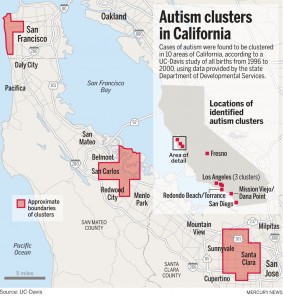 If you look at the far left pink spot of this infographic from the San Jose Mercury News, you’ll see confirmation of what I had always suspected: I went to middle school in an Autism Cluster.
If you look at the far left pink spot of this infographic from the San Jose Mercury News, you’ll see confirmation of what I had always suspected: I went to middle school in an Autism Cluster.
Of course, this was in the benighted ’80s, when there was no autism, only retardation and hyperactivity. But still, I always thought there was something funny in the water.
Except that there wasn’t. The accompanying report by the Mercury News (the paper that believed the CIA was selling crack cocaine, until it didn’t believe that anymore) says that in the Outer Richmond and other clusters, there didn’t seem to be common environmental triggers after all:
“A team of researchers from the University of California-Davis has found one factor that unites this and nine other California clusters of cases of the developmental disability: parental education.”
Good thing I couldn’t get my act together for graduate school.
But seriously, there is some relief in knowing the explosion of autism diagnoses in large part reflects a widening of the autism umbrella; better educated parents are creating autism clusters because they are fighting harder to have their kids diagnosed as autistic. In previous decades, many of those kids would have been written off as unruly or antisocial or just poor students. Now they are diagnosed as autistic and have a wider world of resources at their disposal.
Here’s what I wonder about autism now: how do the families of more severely autistic kids (which includes the lovely family my brother just married into) feel about this explosion of diagnoses of very mild cases? Do they see those kids as being part of the same epidemic? Stricken by the same causes, whatever they may be?
On the one hand, having more children diagnosed has made autism a national preoccupation. But does having mildly hyper kids diagnosed as autistic dishonor or downplay the profound challenges facing severely autistic kids and their families?

In having a son on the Autism spectrum, diagnosed as “high functioning”, and/or Aspergers, I can tell you that our lives are spun up in a great deal of melt-downs, explosions, and extremely difficult learning processes, as are those with children of more severe cases.
Do I think it dishonors or downplays the challenges of more severe cases? No. Isn’t that like asking if one leg that is broken in two places is any less severe than both legs broken in one place? Sure, two broken legs makes it impossible to walk, but one leg with two breaks is still makes mobility quite a chore, no?
I’m grateful that my son is not “worse off” (if that’s even appropriate for such extrordinary children) that he is, but there still is no cake-walk in the matter.
Unless I’m missing your point? 🙂
Yeah, the word ‘dishonor’ is a bit loaded. Really, I’m just wondering if studies like these – which claim that a lot of the high-functioning kids on the spectrum wouldn’t have been diagnosed a generation ago – mean that the less severe and more severe cases are part of different epidemics.
In the end, it’s all about this big question that every parent/future parent has: what is it about these times that makes autism so prevalent? Vaccines, toxins, pollutants, diagnostics–there’s a lot of bogeymen out there, and not many definitive answers, it seems.
Isn’t the comparison more like “Ouch, I stubbed my toe!” vs “OMFG, I broke my leg!”?
Autism is not going away and I am grateful for you tube videos posted by a mom of a severely autistic son with self injury because she’s one of the few people bringing awareness to this side of autism